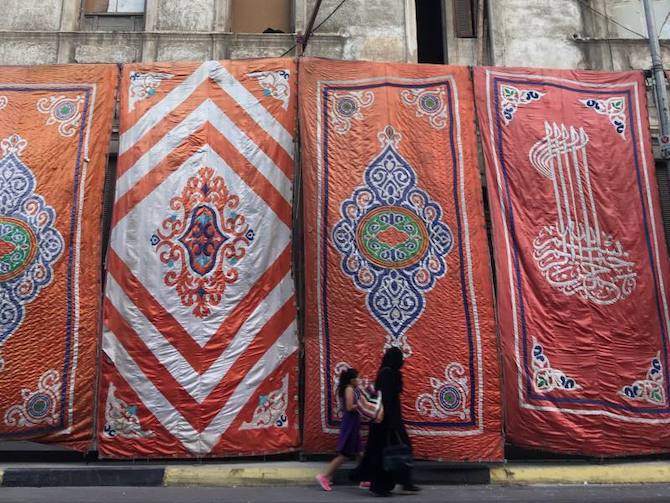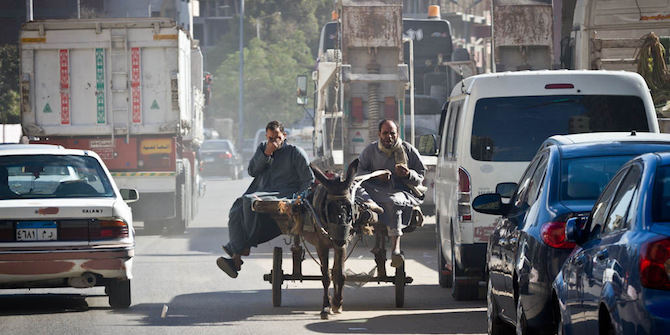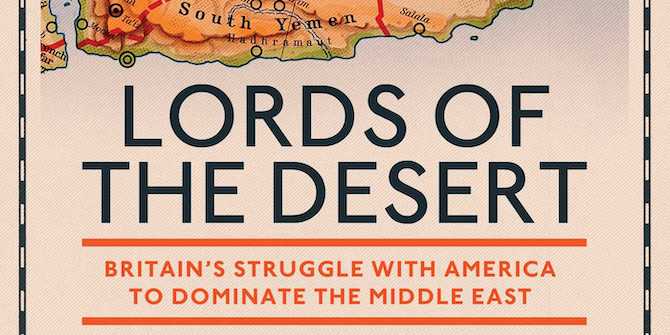by Marwa Makhlouf

Social protection is a human right. However, economic and policy debates surrounding its possible ‘dependency’ effects have always been a concern regarding public budgeting and the impact on labour productivity. Graduation strategies have come into focus, not just to address these concerns, but also to deepen the developmental impact of social protection.
In Egypt, large strides in social protection have taken place since 2015, especially with the introduction of the conditional cash transfer (CCT) programme ‘Takaful and Karama’ (T&K) (which translates to ‘solidarity and dignity’). Recently, the Ministry of Social Solidarity (MoSS) has made moves towards adopting the graduation approach, specifically for its T&K beneficiaries, to provide social protection beyond benefit provision. This piece briefly discusses the possibilities and challenges for sustainable graduation of the poor in Egypt in light of T&K and the anticipated programme ‘FORSA’ (‘opportunity’), intended to act as its graduation instrument.
What is Sustainable Graduation?
It is important first to make a clear distinction between ‘threshold graduation’ and ‘sustainable graduation’. The literature defines threshold graduation as the administrative benchmark (such as a poverty line) after which the beneficiary is no longer eligible for the social protection programme. Sustainable graduation, on the other hand, is a condition where beneficiaries’ lives have been transformed due to the social protection programme and have acquired long-term resilience against dependency.
Takaful and Karama and Moves Towards Graduation
Since 2017, MoSS has made steps towards graduation of Takaful beneficiaries through a programme called ‘FORSA’, which will aim to provide 250,000 with income-generating opportunities. In 2018, Minister of Social Solidarity Ghada Waly appeared in the press talking about the significance of a strategic graduation approach to social protection and announced partnerships with private sector companies to ensure that beneficiaries would have access to stable jobs with health insurance. The exact mechanism and details about FORSA remained vague until it resurfaced again in the World Bank’s additional financing project paper in July 2019.
The World Bank document mentioned scaling up and redesigning FORSA for the purpose of graduation and economic inclusion through partnerships with the private sector and NGOs. The programme is slated to offer employment training and opportunities (including asset transfers) and also apply financial inclusion mechanisms. 70 percent of the budget will be allocated to self-employment activities (where there are no waged employment opportunities) and 30 percent will be directed to waged employment (in economically active regions).
Considerations and Amending Expectations
Even though little information is currently available on FORSA, there are certain factors that need to be taken into account since it is still in the redesigning phase. To achieve sustainable results, FORSA needs to be adapted to the context of the target communities, especially since 70 percent of the budget will be dedicated to self-employment activities. According to the literature, this context relates to factors including environmental unpredictability (for example, differing shocks to rural versus urban households), initial asset level of households (and whether this is sufficient to achieve profitability) and overall conditions of the community (including infrastructure). Another factor is the ability of target markets to benefit from increased self-employment; can these absorb the production from such opportunities to generate sustainable profit? Is there a likelihood that these effects will remain constant if upscaled (such as any impact on prices in case of large-scale investment in similar products)? And what are the strategies to counteract such challenges?
The policy of using self-employment as a path out of poverty is not unknown in Egypt. In 1991, to counteract the impact of ERSAP, Egypt launched the Social Fund for Development (now MSMEDA), which was also partially funded by the World Bank. MSMEDA works on developing micro, small and medium enterprises and partners with NGOs across the country. The Sawiris Foundation for Social Development (SFSD) is also currently piloting an asset transfer graduation approach entitled ‘Bab Amal’ (‘door of hope’), based on the design and technical assistance of BRAC’s TUP which is being evaluated by the J-PAL MENA Initiative. So how will FORSA’s self-employment component be different/complementary? And how will it face the challenges of providing continuous training and marketing support that can result in quality products able to compete in markets or to be assimilated in larger value chains? It appears that it may be worth the World Bank investing in creating waged employment opportunities where these are absent instead of investing in self-employment, which is already being implemented through multiple initiatives.
While context should be built into the theory of change of FORSA, special attention needs to be given to gender specificity, partnerships, monitoring and evaluation, accountability mechanisms and the capacity of programme delivery on a field and ministerial level. Graduation will require intricate programming, capacity building and coordination on multiple levels so as to achieve sustainability and results for investment.
Some amendment to expectations should be considered besides planning and effective programming. Debates are still ongoing on whether larger macro conditions can overpower efforts for graduation such as the state of markets, quality of education and healthcare provision (where Egypt faces major challenges). In all cases, it has become evident that to increase chances of sustainable graduation, contextual and macro conditions need to be taken into account, which highlights the need for cross-ministerial linkages between state planning and social protection strategies. One such aspect is observed in the recent cooperation between MoSS and the Ministry of Supply and Internal Trading ensuring that all T&K households are provided with ration cards.
Assuming that all the necessary considerations are taken into account, another issue lingers: how can the success of sustainable graduation be measured? Between taking a capabilities approach to finding a tool to measure resilience of households in the long run, graduation programming in Egypt needs to identify this step in the design phase and make sure that there is available capacity and expertise to mobilise accurate data collection and analysis.
What’s Next?
Can the Egyptian social protection system be a vehicle for sustainable graduation out of poverty? The question is difficult to answer at this stage; sustainable graduation is a gradual process and hardly a one-step quick fix. Myriad conditions need to be met to provide secure, stable and productive livelihoods. Hope has been ignited with talks of a graduation approach to social protection through FORSA, but this will need to be closely monitored to see whether effective design, implementation and coordination (with FORSA and other complementary initiatives) can open the door for sustainable graduation.
This blog is part of the LSE Academic Collaboration with Arab Universities project, in collaboration with the American University in Cairo, ‘Can Social Protection Empower Women? Patriarchy, Economic Agency and Redistribution Policies in Egypt’.







1 Comments